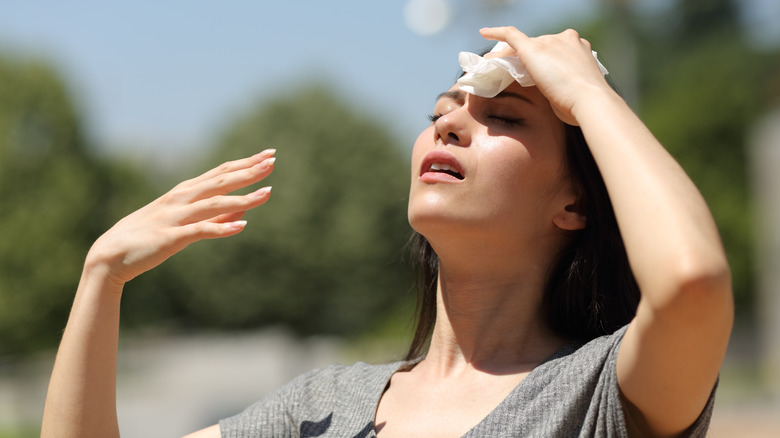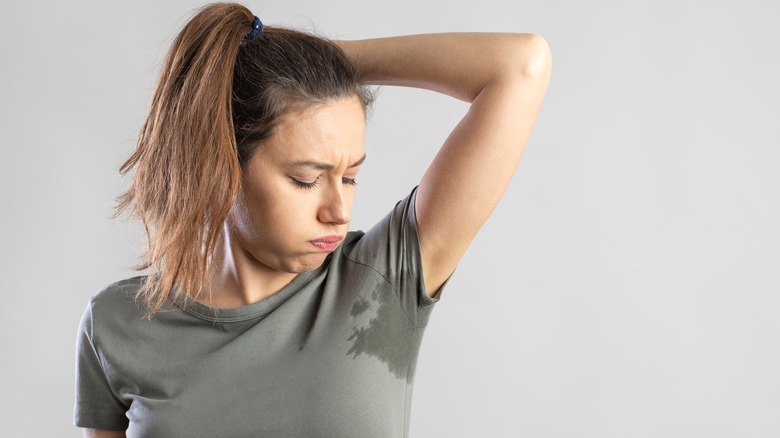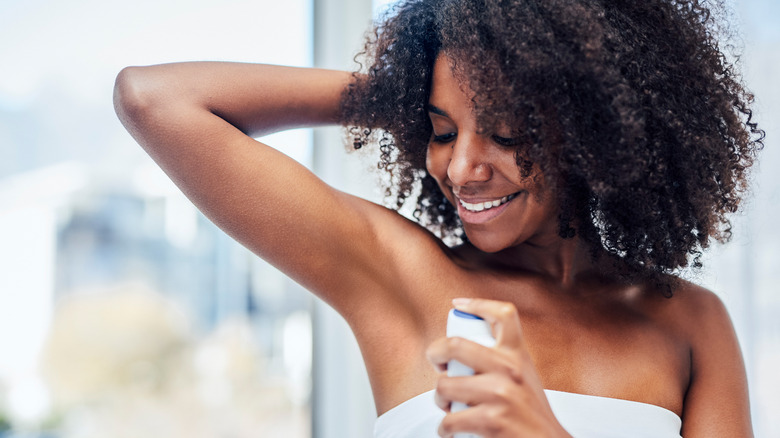We're Waving Excessive Sweat Goodbye This Summer And Here's How We're Doing It
We may receive a commission on purchases made from links.
Humans can have anywhere from 1.6 million to 5 million sweat glands throughout their bodies. And whenever you engage in strenuous physical activities or feel the sun's wrath during the warmer months, those glands work extra hard to regulate your body temperature. The result? Good ol' perspiration.
As embarrassing as it can be to deal with pit stains, sweating is actually good for you. Not only does perspiring cool your body down, but it helps your skin sparkle too. "Sweat will help the skin look moisturized and 'dewy,' which may be seen as improving its appearance," dermatologist Dr. Jodi Ganz told Piedmont. Sweating may also support heart health and even contributes to lifting your mood. "Hot blood from the interior can swoosh past the veins near the skin, get cooled down by sweating, and then circle back to cool the interior," Sarah Everts, a science journalist and author of the book, "The Joy of Sweat: The Strange Science of Perspiration," explained to Real Simple. "This workout for your heart releases happy hormones, like endorphins, that give you a biochemical rush of joy and catharsis."
Even though sweat is considered normal and beneficial, some of us sweat more than others, which can pose an inconvenience at times — especially in the summer when you're just trying to stay stylish when the heat is on. If you find that you're often sweating through your clothes more than you'd like, it could be a sign of something else going on in your body.
Why am I sweating so much?
The amount of sweat your body excretes is dependent on a number of factors, including your body and muscle mass, age, and fitness level, per Henry Ford Health. But if you notice that you're sweating after doing anything remotely physical, or sometimes even nothing at all, it could be a sign that you have hyperhidrosis, a condition that affects an estimated 15 million people in the United States. "Hyperhidrosis is abnormally excessive sweating due to the fact that your sweat glands aren't functioning properly and don't turn off," Dr. John Whyte, chief medical officer of WebMD, shared with Prevention.
Some people are naturally predisposed to hyperhidrosis, while some contract it as a result of having other health concerns or illnesses. "Secondary hyperhidrosis implies that it is related to something else, like a medication, thyroid disorder, adrenal condition, diabetes, or nervous system disorder," double board-certified dermatologist Dr. Brendan Camp told Byrdie.
Hyperhidrosis can also be brought about by your hormones going haywire, and this is especially true for people going through perimenopause or menopause. "In menopause, estrogen and progesterone levels change, which impacts your internal thermostat," Dr. Whyte told Prevention. As a result, your body temperature goes into overdrive, bringing forth the infamous hot flashes.
Is it possible to minimize sweat?
Regardless of the reason behind your sweating, there is almost an endless list of ways you can manage your extreme perspiration. Aside from the obvious ones like wearing breathable clothing, keeping cool, and staying hydrated, you can try adding a clinical strength antiperspirant to your evening routine. "Applying an antiperspirant at night is ideal as the body temperature is lower and often skin is drier, allowing for a more effective application," dermatologist Dr. Tara L. Kaufmann told Business Insider. You may also want to nix underarm hair to help maximize the impact of the antiperspirant.
You can also make minor modifications to your diet, like minimizing your caffeine and spicy food consumption. "Caffeine triggers sweat as it excites the central nervous system, which then activates sweat glands," Dr. Joshua Zeichner, director of Cosmetic and Clinical Research in Dermatology at Mount Sinai Hospital in New York City, shared with USA Today. "Similarly, avoid spicy foods like hot sauces, peppers, and spices, which can increase the amount of sweat you produce."
If all else fails, there's always Botox, which the International Hyperhidrosis Society notes can reduce armpit sweat by up to 87% and sweaty palms by up to 90%, with results lasting as long as 14 months. Alternatively, you can also consult your doctor about prescription antiperspirants like Drysol, or perhaps more permanent treatments like radiofrequency microneedling and miraDry, a device that destroys sweat glands.


